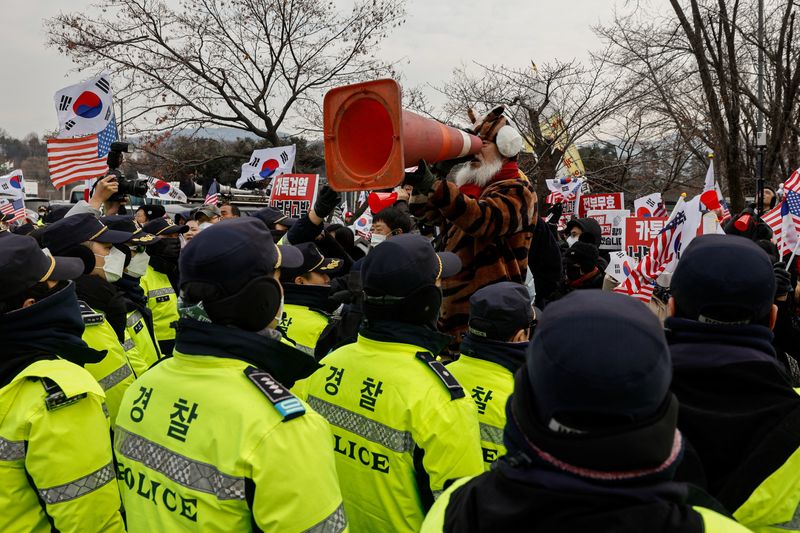By Joyce Lee and Joo-Min Park
SEOUL (Reuters) – Arrested South Korean President Yoon Suk-yeol failed to turn up for a second day of questioning by investigators on Thursday, further stonewalling a criminal probe into whether he rebelled with his martial law bid. was
Yun on Wednesday became the first sitting South Korean president to be arrested and taken to a Seoul detention center after refusing to cooperate. He remained at the center Thursday, with his lawyer citing his health as a factor.
Authorities have 48 hours to question the suspended president, after which they must release him or seek a warrant to detain him for up to 20 days.
Yun’s refusal to cooperate with investigators comes as the Constitutional Court holds a second hearing in his impeachment trial to determine whether to permanently remove him or restore his presidential powers.
South Korea is grappling with its worst political crisis in decades, triggered by Yun’s brief attempt to impose martial law on December 3 that was rejected by parliament.
Opening the debate at the Constitutional Court, a lawmaker from the opposition Democratic Party condemned Yun for the “December 3 Uprising” and said that Yun and some supporters tried to create chaos by refusing to accept his arrest warrant. had done
“This impeachment trial decides whether or not to reinstate someone like this to the position of commander-in-chief under the control of the military,” said Jung Chung-rae, head of the parliament’s Legislation and Judiciary Committee.
In response, one of Yun’s defense team said the purpose of his impeachment was not to protect the constitution but for the opposition to “use the majority power of parliament to usurp the presidency”.
The main opposition Democratic Party used its majority in parliament to bring about Yun’s impeachment vote, although some 12 lawmakers from Yun’s own party also voted in favor of impeachment.
An opinion poll conducted by Realmeter on December 4, the day after Yun’s declaration of martial law, showed 73.6% supported Yun’s impeachment.
Meanwhile, the latest opinion poll conducted by Realmeter on January 9-10 showed support for Yun’s ruling party at 40.8%, close to the main opposition Democratic Party’s 42.2%.
Yoon’s lawyer Cho Dae-hyeon said the suspended president’s decision to declare martial law was made in good faith based on his view that the country was in a state of emergency.
Bae Jin-Han, another of Yun’s lawyers, quipped: “Some say ‘if you breathe, you will be impeached’.”
Yoon’s arrest on Wednesday ended a weeks-long standoff with authorities after police held off frustrated followers at the site before dawn at his fortified mountain villa in Seoul.
Yoon said he asked himself to stop risking “unholy blood” for questioning by corruption probe officials, though he continued to protest that it was an illegal investigation and an invalid arrest warrant.
Court to review arrest warrant
The embattled leader has so far refused to speak to investigators who prepared a more than 200-page questionnaire, said an official at the Corruption Investigation Office (CIO), which is leading the criminal probe. was
His questioning was scheduled to resume at 2 pm (0500 GMT) on Thursday, but the CIO said they had been informed by Yun’s side that he would not be attending.
Yonhap quoted Yoon Kab-kyun, one of Yoon’s lawyers, as saying that the ousted president’s health was a factor and saying further inquiries were futile, without elaborating.
A small crowd of protesters supporting Yun gathered and sat down on a street outside the CIO office, calling the president’s arrest illegal.
His lawyers have said the arrest warrant is illegal because it was issued by a court in the wrong jurisdiction and the team formed to investigate him had no legal mandate to do so.
They have also asked another court to review the legality of the arrest. According to the CIO, Yun’s arrest period has been temporarily suspended for 48 hours while a court review is underway.
His legal team has denied charges against Yoon of masterminding the rebellion, a crime in South Korea punishable by life imprisonment or technically even the death penalty.
South Korea last carried out executions for criminal offenses such as murder in 1997.
The political crisis has gripped Asia’s fourth-largest economy and put pressure on the won currency.

South Korea’s central bank governor said on Thursday that the most important factor determining the health of the economy in the coming months was whether political chaos had stabilized.
“That’s why the normalization of the political process is more important than cutting interest rates a month earlier or later,” Ri Chang-yong said, speaking after the Bank of Korea unexpectedly kept policy interest rates steady at 3.00% on Thursday. said Analysts rate cut expectations.










